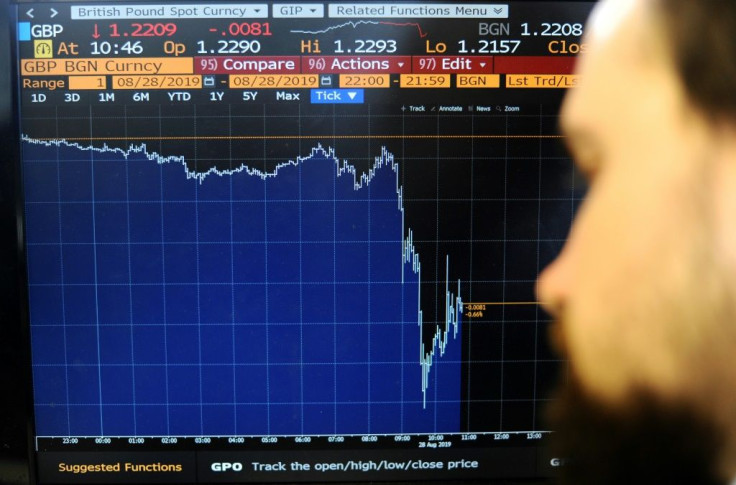Pound dives on increased no-deal Brexit prospect

The pound fell against the dollar and euro on Wednesday as Britain's government moved to extend the suspension of parliament, increasing the likelihood of a no-deal Brexit.
Meanwhile, global stocks had a mixed day, with Wall Street staging a late rally, shrugging off its fears for the slowing world economy.
In London, British Prime Minister Boris Johnson announced that the annual suspension of parliament would be extended until October 14 -- just two weeks before the UK is set to leave the European Union.
Britain's currency slid by more than one percent against the dollar and euro in early business, before paring some of the loss.
"The pace of sterling's drop demonstrates yet again the currency's susceptibility to Brexit fears," said Han Tan, market analyst at FXTM trading group.
The pound's plunge helped London's benchmark FTSE 100 index outperform as it features many multinationals with most of their earnings in dollars -- whereas construction companies notably saw their shares take a tumble.
Anti-Brexit MPs said Johnson's move amounted to a coup and a declaration of war, branding the prime minister a dictator.
In New York, the gloom lifted as energy stocks benefitted from a plunge in crude oil inventories, pointing to sustained demand for fuel, a sign of economic health.
In light-volume, late-summer trade, Wall Street climbed out of the red and rallied, casting aside worries about Brexit, the escalating US-China trade war and Brexit.
Adam Sarhan said the lower prices early in the day had attracted bargain hunters.
"Every time the market fell off the last month, we've seen the buyers show up and curb the selling," he told AFP.
Earlier Wednesday, yields on 30-year Treasury bonds touched a fresh all-time low while the spread between 2- and 10-year Treasury notes widened the most since 2007, indicating waning confidence in the longer-term outlook and drawing more attention to this closely-watched recession indicator.
Major European bourses fell. But a poll showed German consumer sentiment is stabilizing after three months of decline and despite fears of a looming recession in Europe's biggest economy.
Energy shares also were supported by Iranian President Hassan Rouhani's call for the United States to lift all sanctions against his country before he would meet Trump, after the US leader had said he would be open to talks.
In government bond markets, Italian bond yields fell below 1 percent, their lowest level ever, on hopes that a new government can be formed without fresh elections.
Key figures around 2100 GMT
Pound/dollar: DOWN at $1.2213 from $1.2288
New York - Dow: UP one percent at 26,036.10 (close)
New York - S&P 500: UP 0.7 percent at 2,887.94 (close)
New York - Nasdaq: UP 0.4 percent at 7,856.88 (close)
Euro/pound: UP at 90.67 pence from 90.25 pence
Euro/dollar: DOWN at $1.1076 from $1.1083 at 2100 GMT
Dollar/yen: UP at 106.14 yen from 105.77 yen
London - FTSE 100: UP 0.4 percent at 7,114.71 points (close)
Frankfurt - DAX 30: DOWN 0.3 percent at 11,701.02 (close)
Paris - CAC 40: DOWN 0.3 percent at 5,368.80 (close)
EURO STOXX 50: DOWN 0.2 percent at 3,365.38 (close)
Tokyo - Nikkei 225: UP 0.1 percent at 20,479.42 (close)
Hong Kong - Hang Seng: DOWN 0.2 percent at 25,615.48 (close)
Shanghai - Composite: DOWN 0.3 percent at 2,893.76 (close)
Brent North Sea crude: UP 98 cents at $60.49 per barrel
West Texas Intermediate: UP 85 cents at $55.78 per barrel
burs-dg/hs
© Copyright AFP 2024. All rights reserved.





















